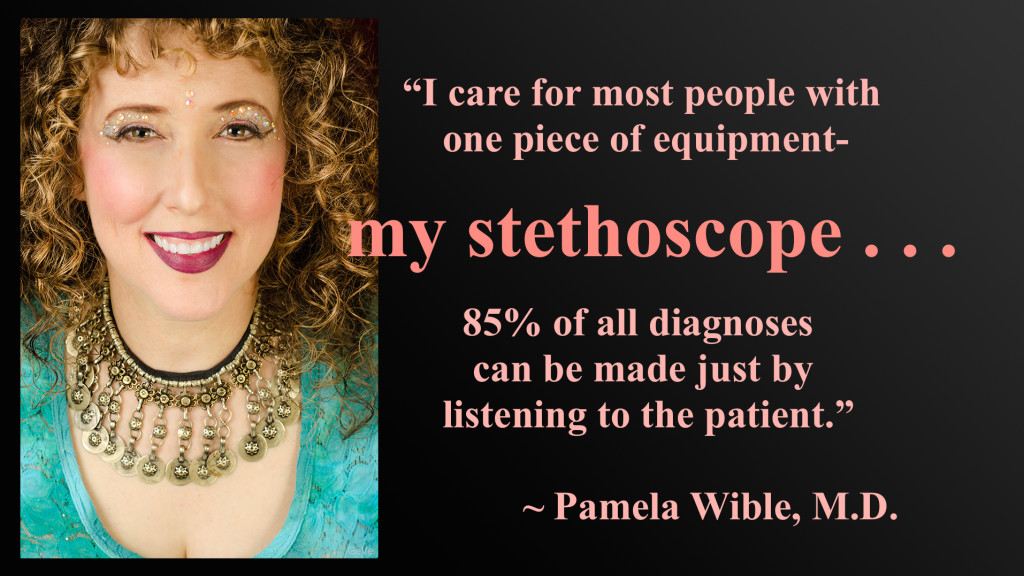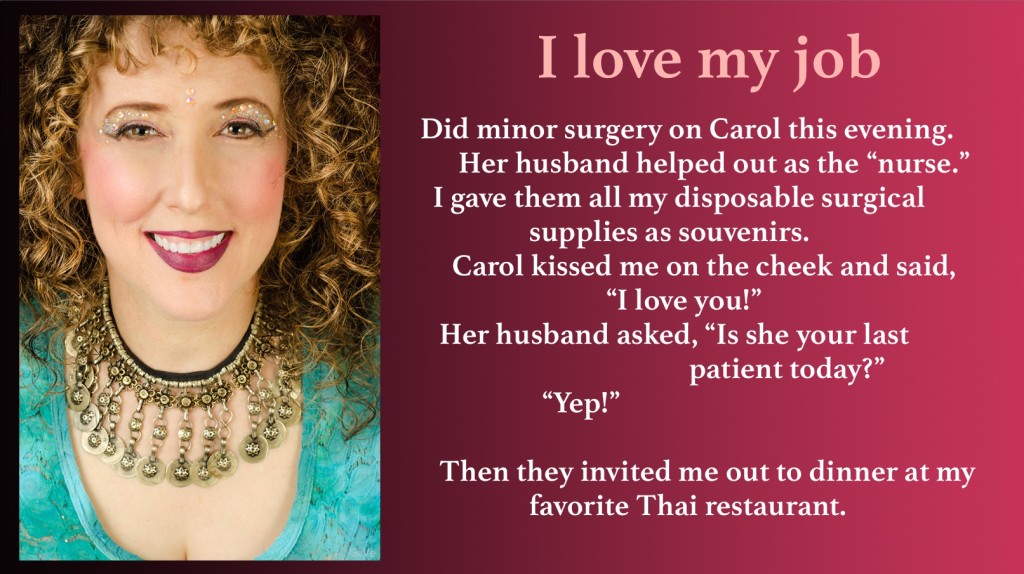
***
How To Do a House Call on a Quadracycle →
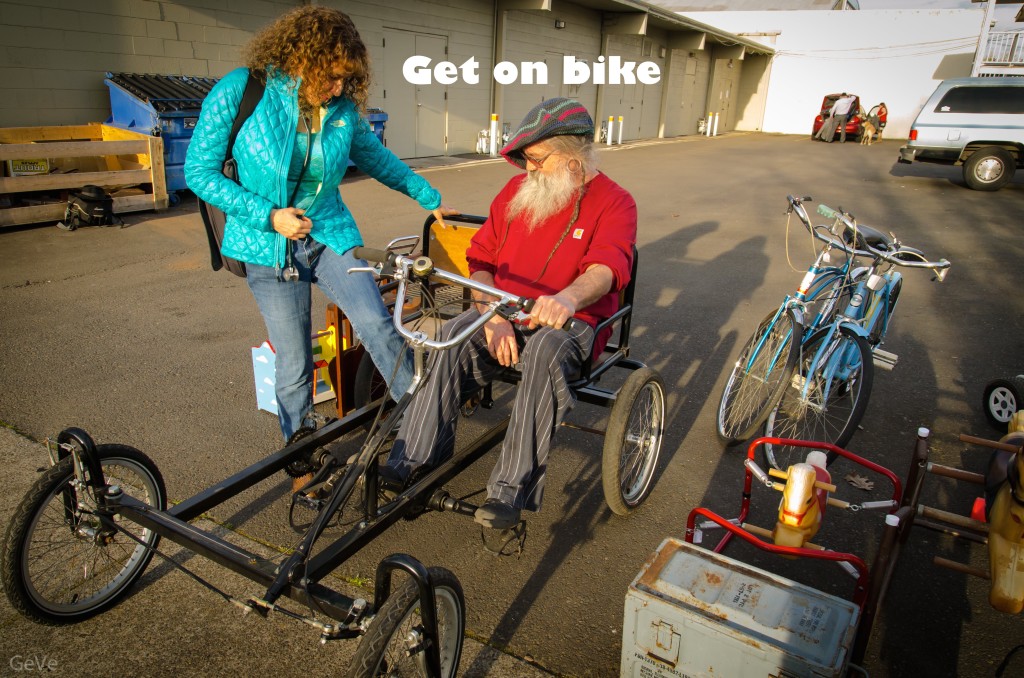
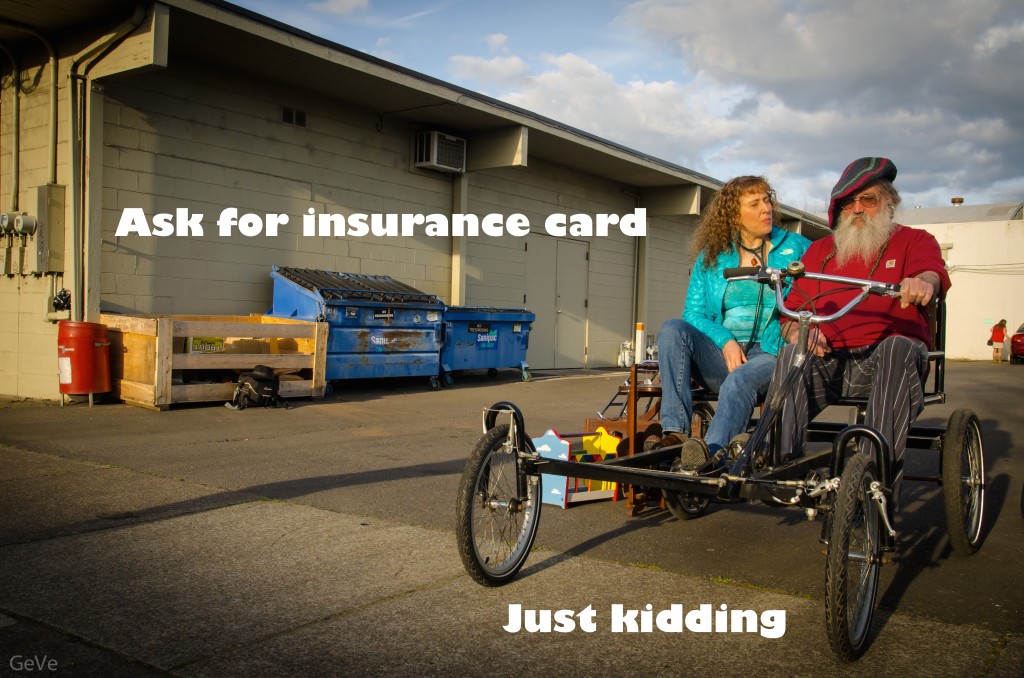
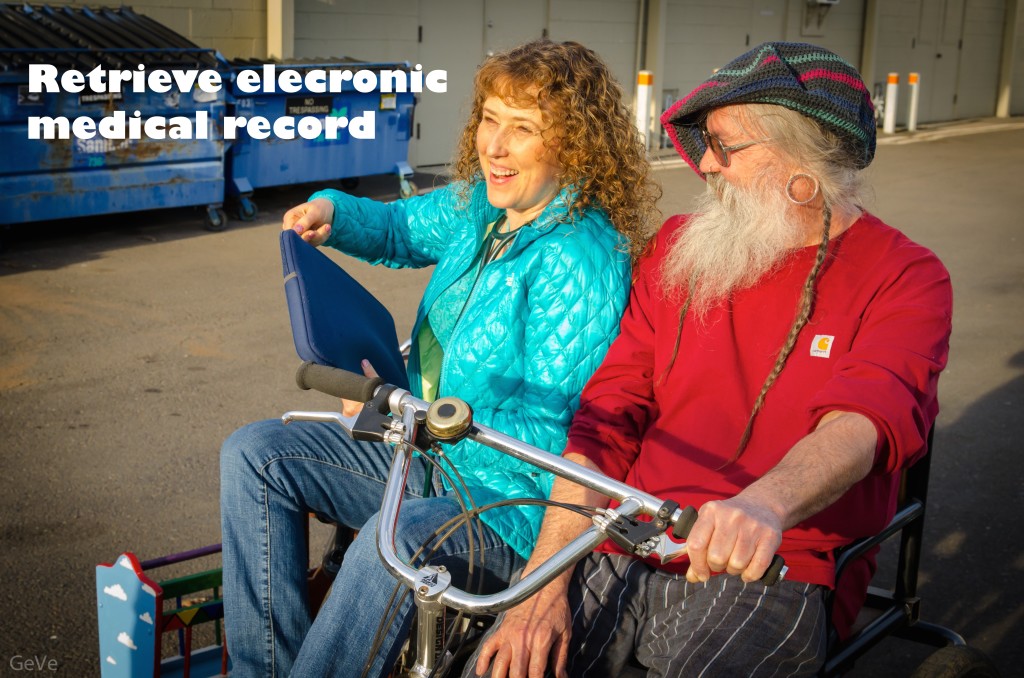
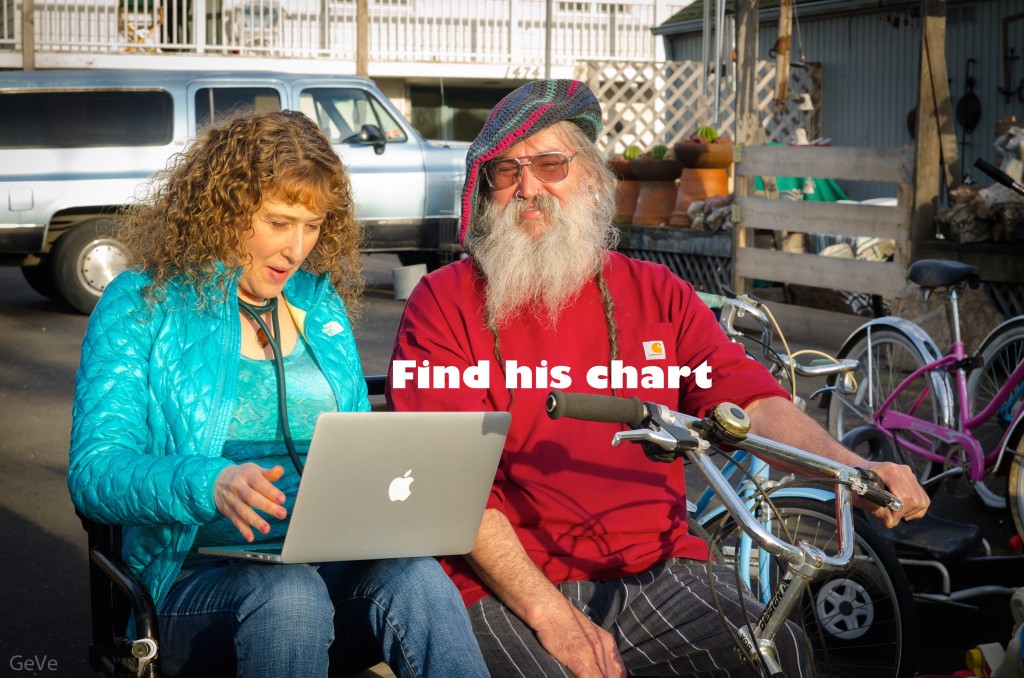
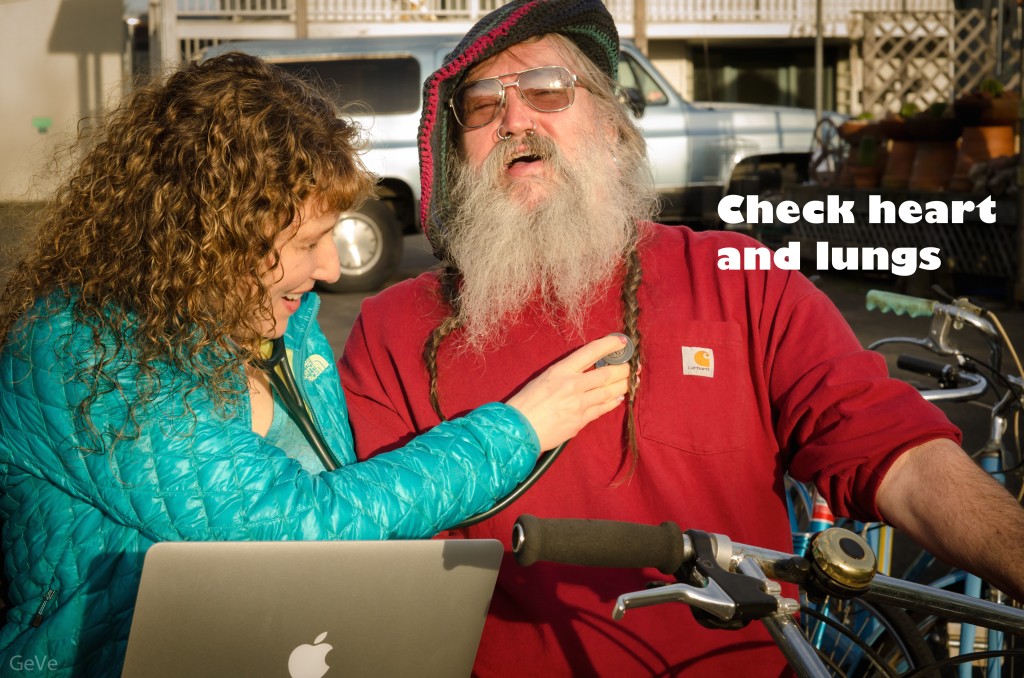
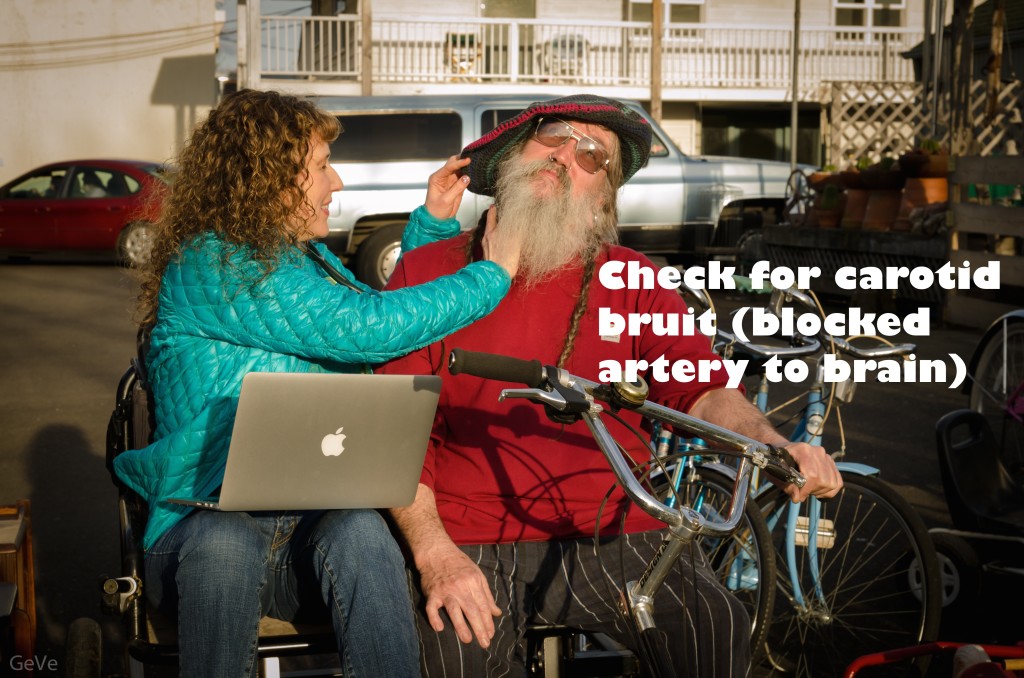

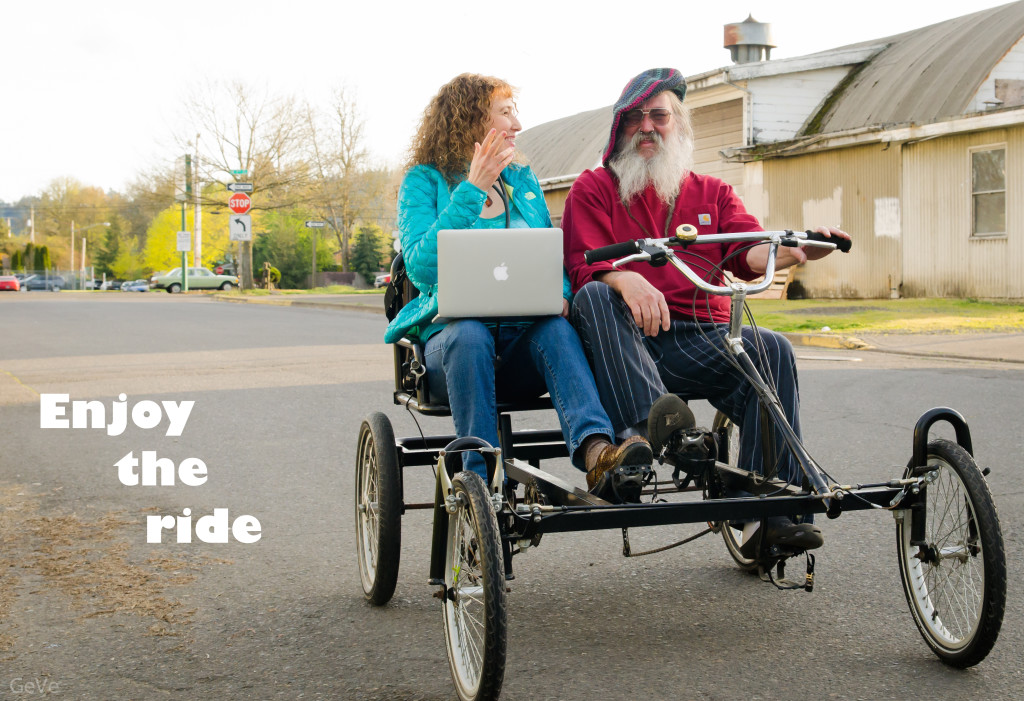
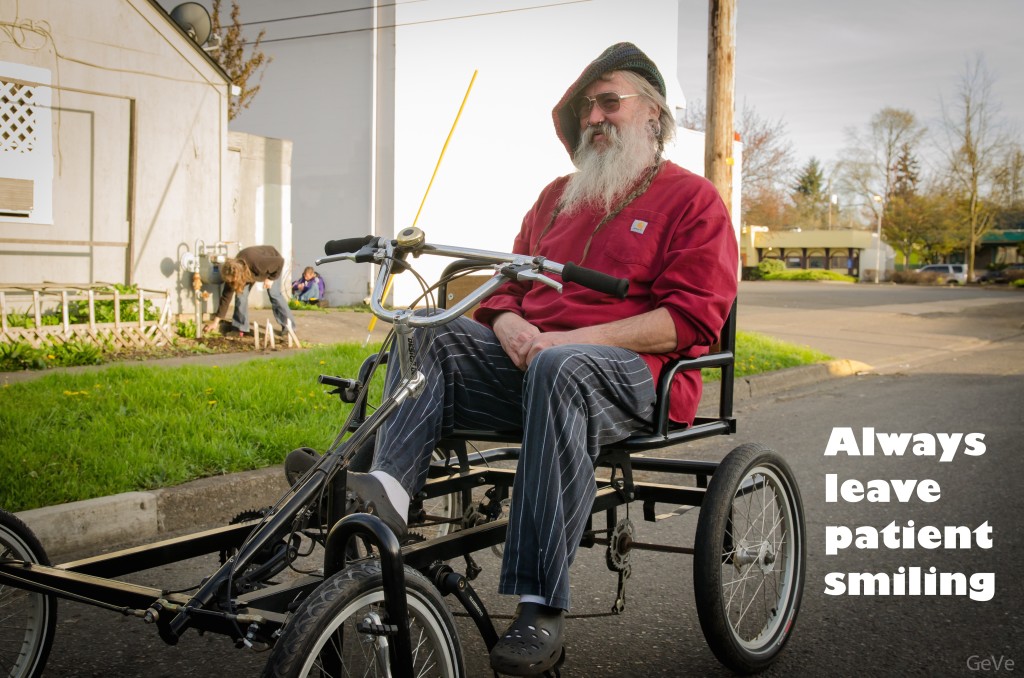
Click here to read part 1 of the story.
Pamela Wible, M.D. is a family doctor is Oregon. Watch her TEDx talk here. Photos by GeVe.
***
Why I Love House Calls →
I’ve always been a people watcher. Now I get paid to spy on folks. I have to ask detailed, personal questions. Sometimes I even snoop around patients’ homes.
In the 1930s nearly half of all patient visits were house calls. Now most patients are rushed through ten-minute office visits. But if I need to know what’s going on with a patient, I stop by—unannounced. Today I’m surprising Terry Wayne.
He lives in an industrial area just across from the big homeless shelter—the only house on the block. Aha! I see it. Looks like his kinda place. It’s a buy-and-sell-pawn-shop-looking compound.
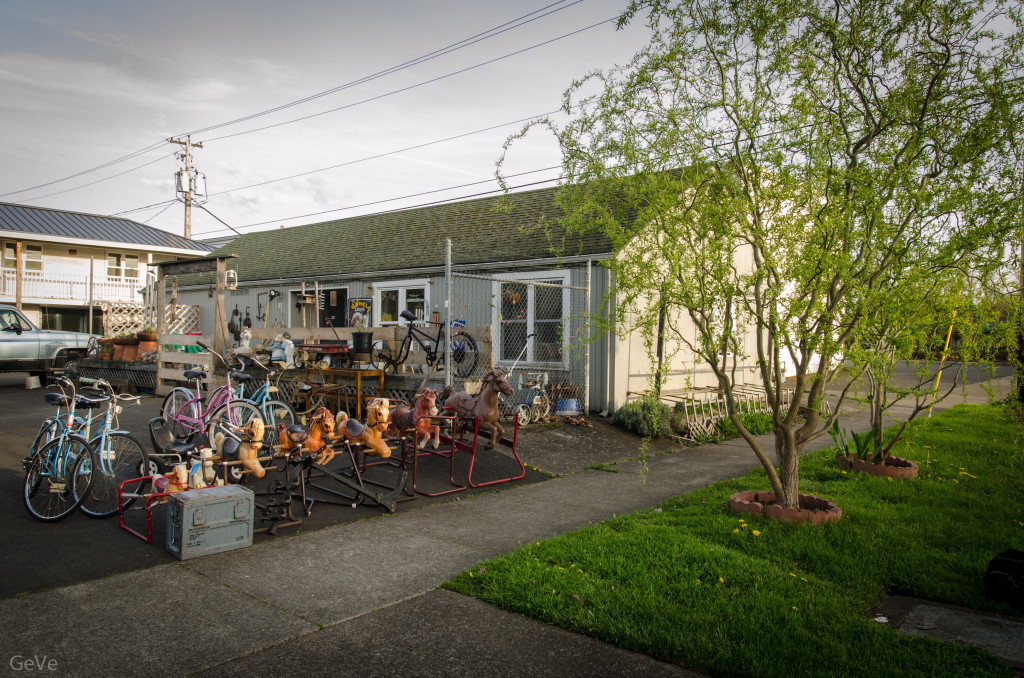
I walk right in past the alien hanging on the front door.
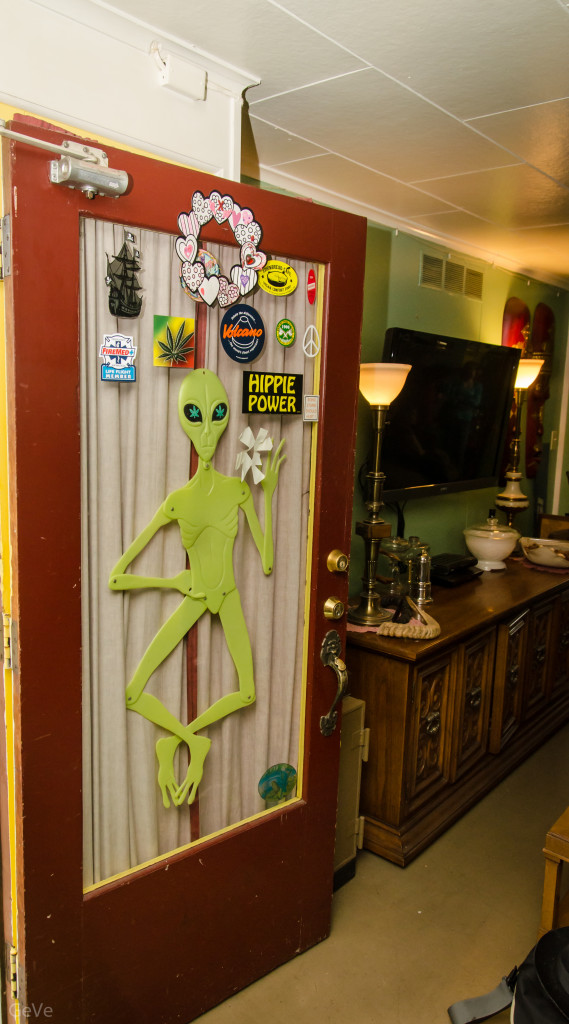
Looking up from his chair, Terry seems overjoyed to see me. A hippie from Birmingham, Alabama, he found refuge in Eugene, Oregon. He’s been coming to my office for eight years. Now he’s giving me a tour of his place. First he poses with the gift he just got from his granddaughter: a Terry look-alike doll!
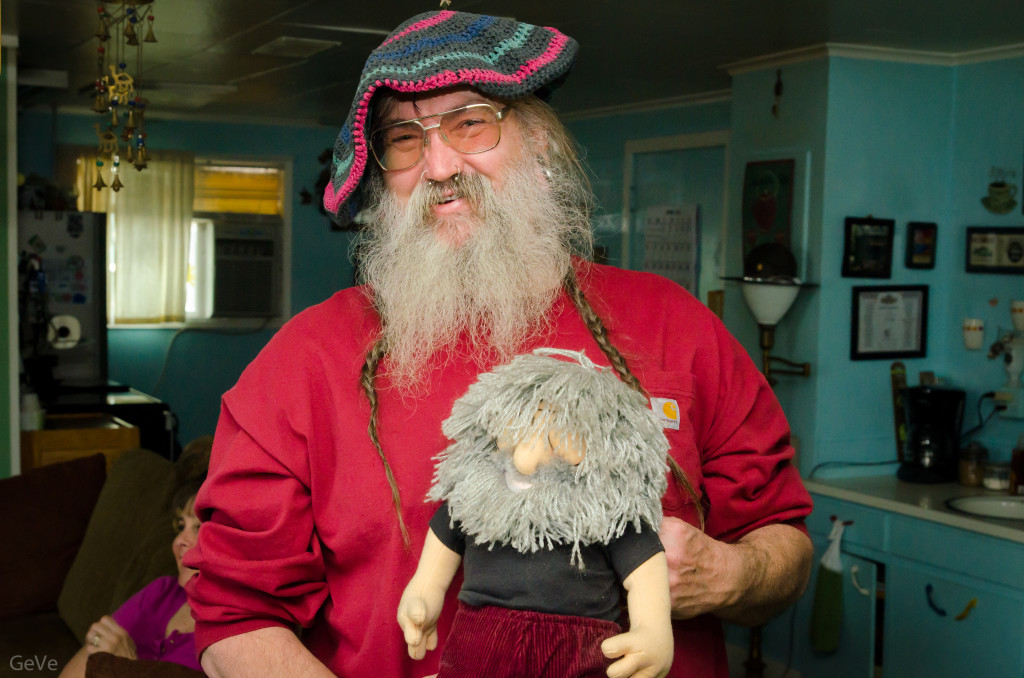
“I been upset ’cause my granddaughter just moved out with my daughter. My daughter’s homeless and two centimeters. Having her baby any day now. We’re not sure where she and her boyfriend run off to. Been losing sleep over this.”
His wife, Rhonda, shows me the room where their daughter and granddaughter were staying. I turn around and see a cookware display. He’s been paying me all these years by selling cast-iron pots and pans. “Yep. Here’s my collection I was telling you about. They’re all from the 1800s.”
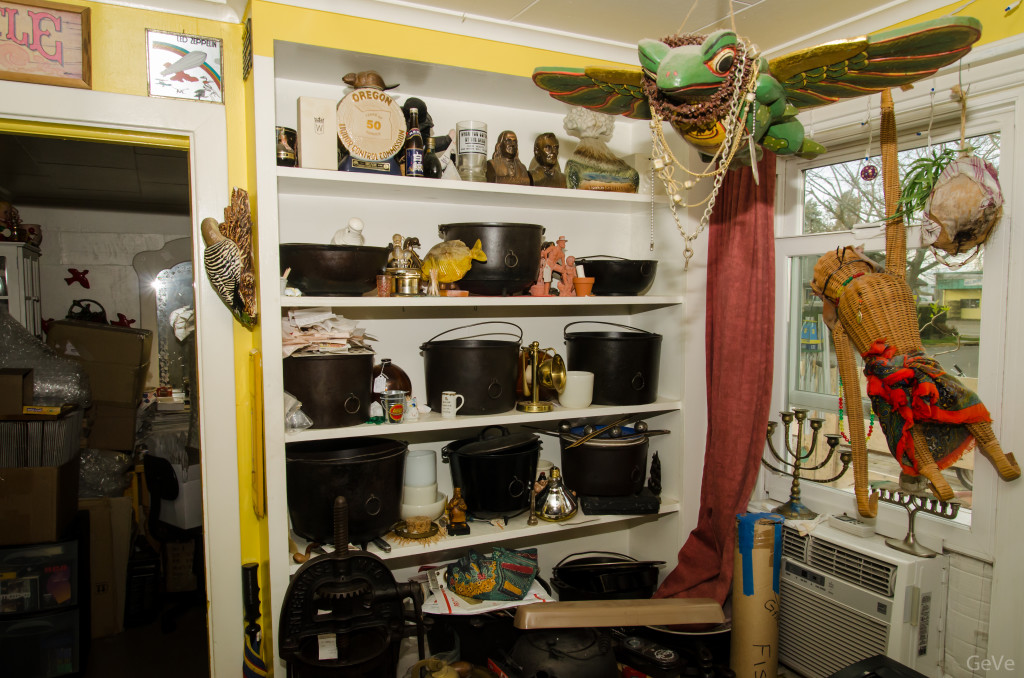
Snooping around his house, I notice a lot of cool stuff:
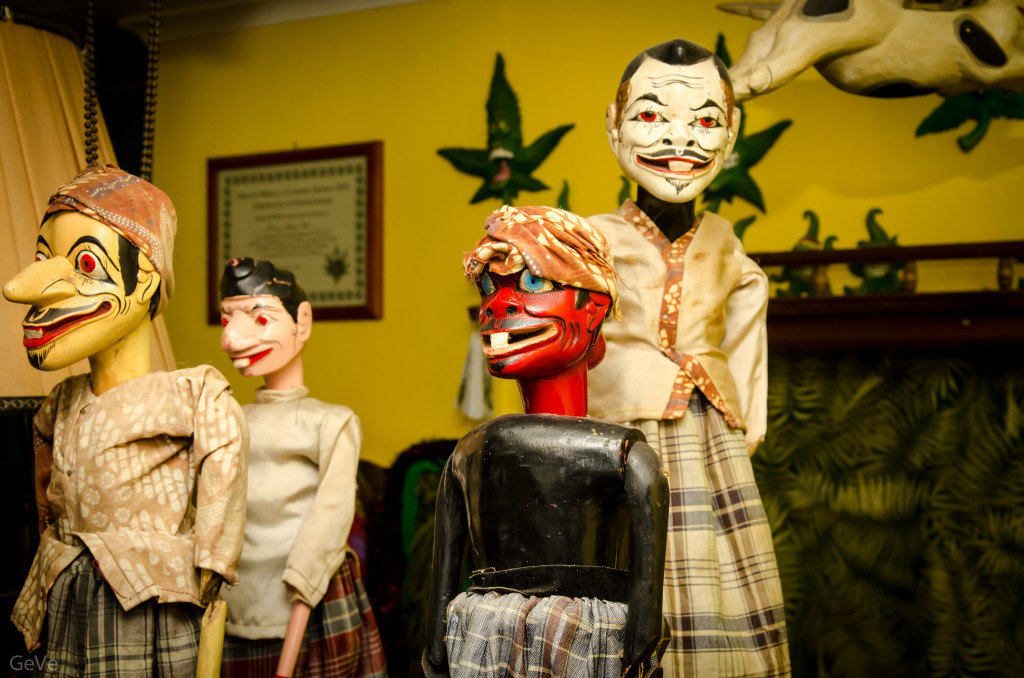
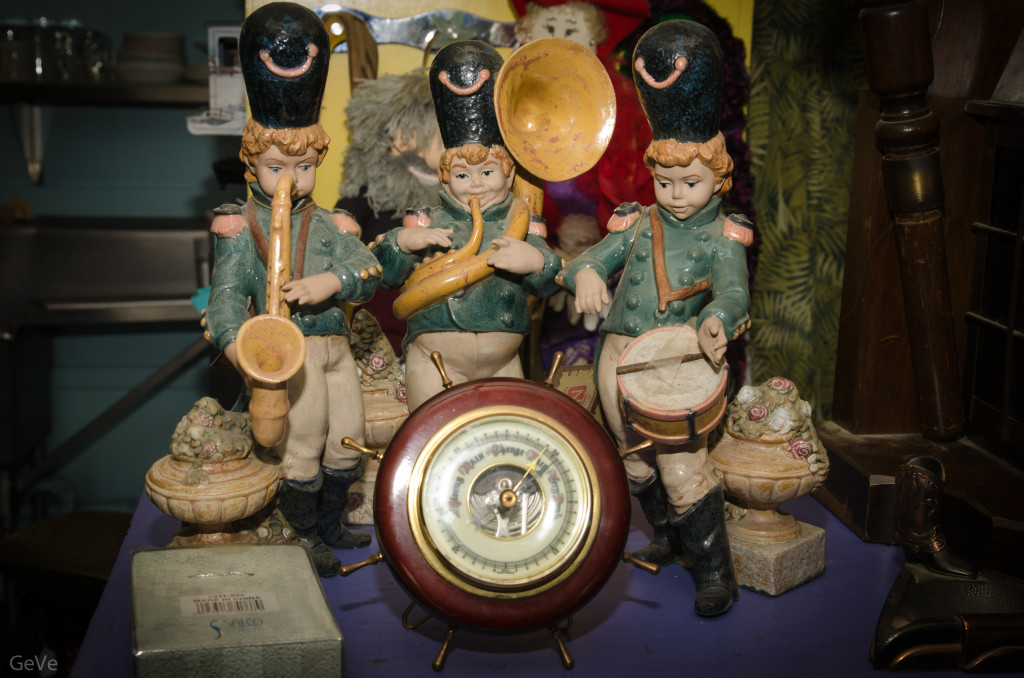
“I pick things up at garage sales and thrift stores, then I sell ’em on eBay,” he says.
His wife leads me through a secret door into the back room where he keeps most of his collection.
“What does Rhonda think of all this?” I ask.
“She don’t mind long as the main part of the house is clean.” Terry is obviously proud of his stockpile. “Everything’s made in the USA,” he says.
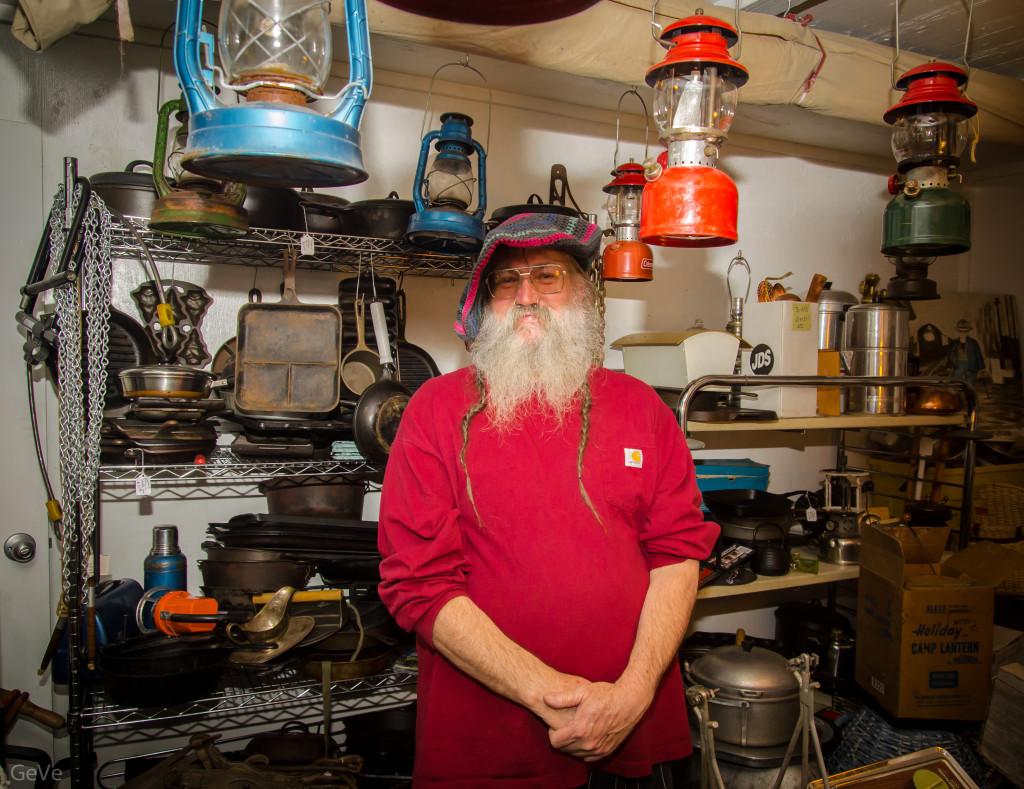
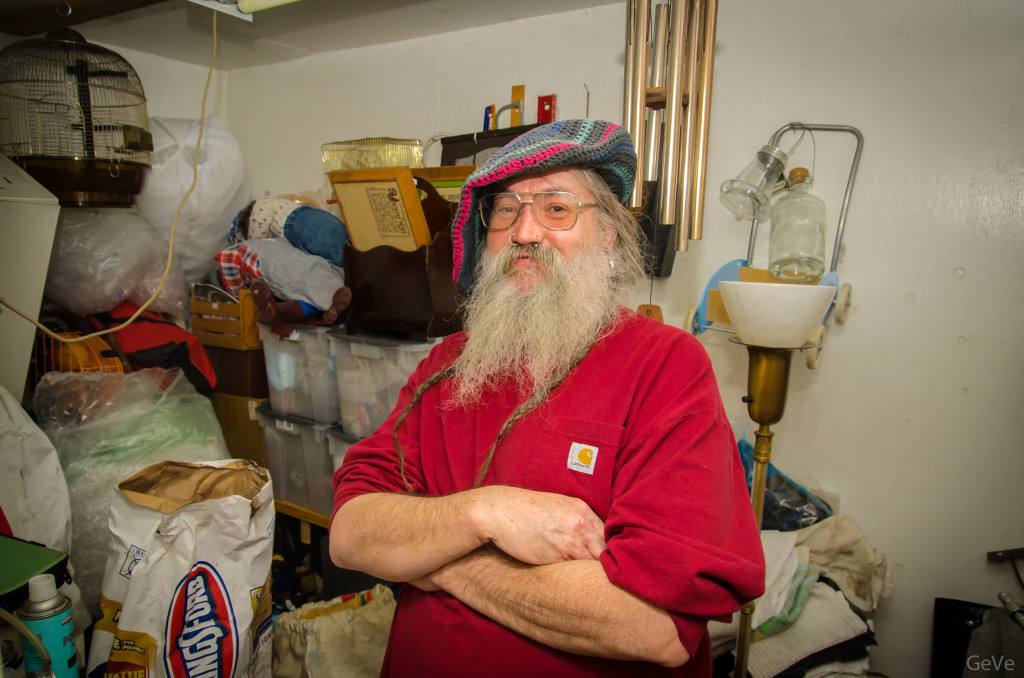
Terry Wayne is diabetic. He tries to eat healthy. I check his heart while he stands by the fridge. “Cutting out ice cream and them bags of gummy worms has really helped me lose weight, doc.”
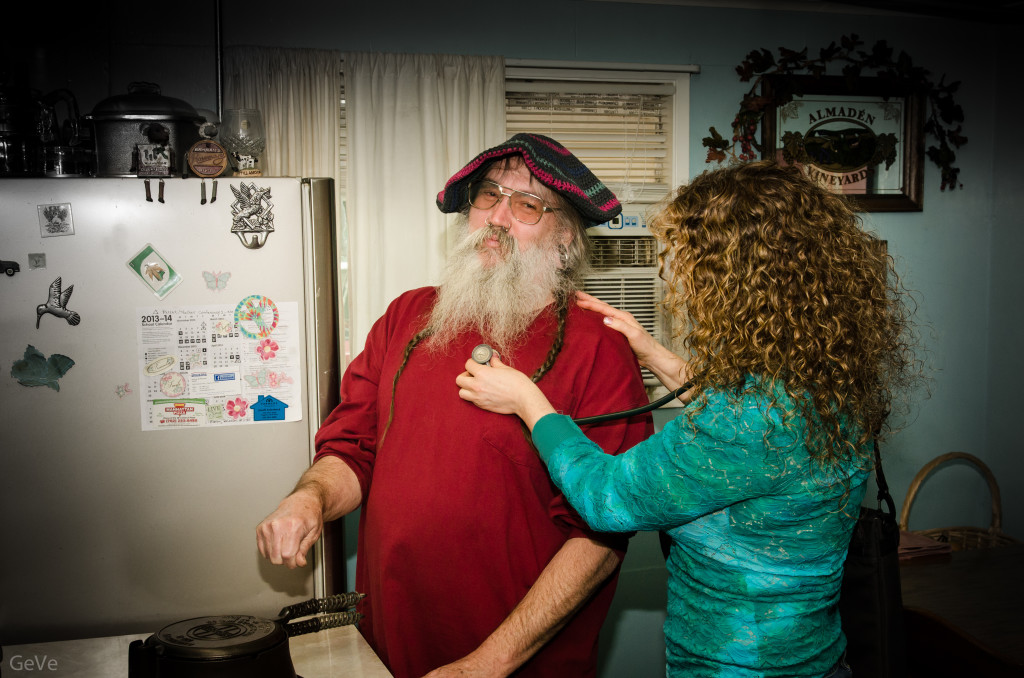
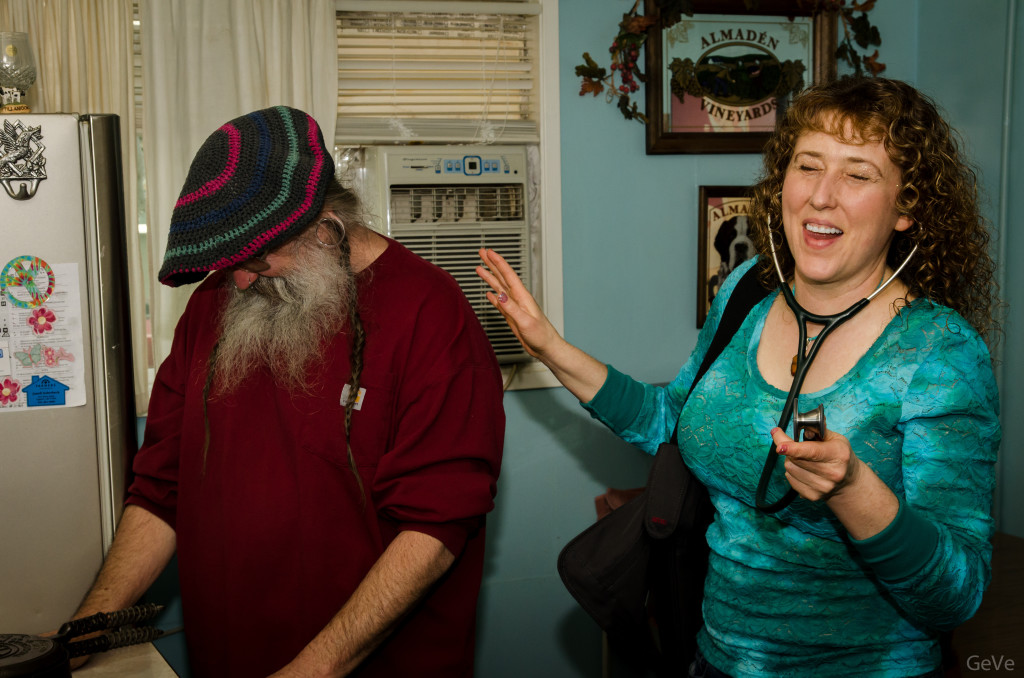
Terry exercises every day. “Been fixing up these bikes.” He takes me on a ride around the block on his quadracycle. “You know me and Rhonda’s never been on a plane. Travel makes me anxious. I need to be in my own bed at night. Even then, my brain won’t go to sleep. I have nightmares about being locked up in the South. I’m better during the day. I’m not really afraid of anything—except tornados and my government.”
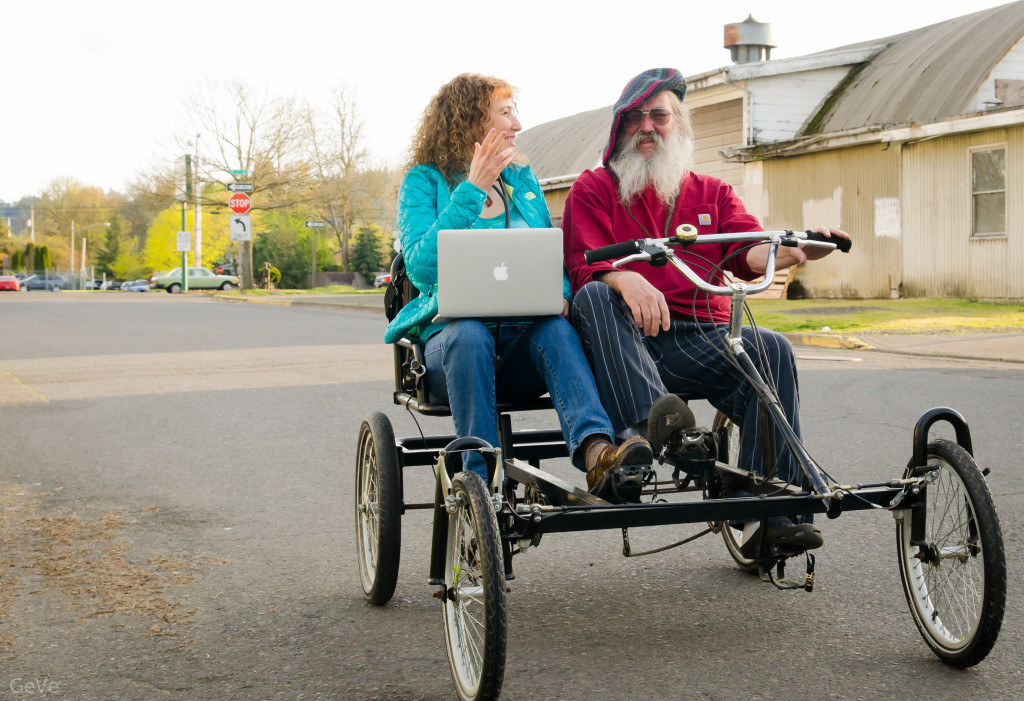
While he pedals, I take a few notes on my laptop, then finish up his chart when I get home. Next morning I get this e-mail:
“I just wanted to let you know I had a great time yesterday. It was the first time I have laughed or enjoyed anything in months. I have been trying to describe Rhonda and my feelings about this whole family thing, and thanx for letting us vent on you. From what I have been searching online I think we both are experiencing pure mental anguish which is leading to both our emotional distress. It feels weird having a doctor as a friend but boy does it feel great. We both love you and your real heartfelt concern for us.”
I guess a house call is like visiting a friend you love who just happens to be a patient.
(Click here to read part 2 of this story.)
Pamela Wible, M.D. is a family doctor is Oregon. Watch her TEDx talk here. Photos by GeVe.
***
***
Physician Suicide Letters →

I asked why physicians were dying by suicide. Here’s what they told me:
“I definitely graduated from med school with PTSD. It has changed me forever. My mom’s friend that I have known since I was born saw me for the first time since I went to med school and she [told my mom], “She has changed so much. Was it worth it?” I wish I could change back but I realize that I will never be the same again and it isn’t in a good way. We had two suicides and one murder—skull crushed with a bat—and one serving life in prison for murder during a delusional episode after not sleeping for almost a month. Yes I went to a hard-core school (old school kind of place). PTSD isn’t benign; it truly affects you to the core—it changes your brain.” ~ Doctor in Philadelphia
“I’m in my first year of practice outside of residency and I can’t begin to tell you how often I think of death. Not because I hate my life—I have a wonderful husband and family. But the pressures of daily life as a doctor are overwhelming. I work constantly! Even on my days off, I’m working. When I take a day off, I pay for it later by double the amount of work waiting for me. I have patients yelling at me when all I wanted to do was help. They try to fool me and manipulate me. Insurance companies deny my patients help, leaving me with no resources to help. My boss is a douche—unethical and dangerous. I want to build a relationship and do what’s right for my patients—but the company pushes me to see more and more patients in less and less time. I cry at work, I cry myself to sleep sometimes. I don’t feel depressed, and I know my life has value, but sometimes the thought of suicide is just to escape the pressure of the profession. It’s not like I can realistically give up the job, my calling. I’m neck deep in debt and will never be able to pay it back if I leave the profession.” ~ Michelle
“I didn’t realize that so many others in the field suffered as I do. I have tried to get help many times but it’s hard because I don’t think that anyone takes me seriously and I don’t think I can be completely honest with anyone without major repercussions. I don’t have any friends to socialize with and all my relationships have failed. I come from a background where I was the first to get a higher education so they think that I should be elated to just have MD behind my name and tell me to suck it up. I don’t want to possibly lose my license because honestly I love taking care of patients and sometimes that is the only time I get a few moments of happiness. But things have just been so bad for me that I have resorted to just doing locums [fill-in work] so I can isolate myself because sometimes I can’t stop the tears. I have tried a few times and the last time probably would have worked but at the time I was lying there looking at the dog I had then who was curled beside me nudging me to get up. Somehow I drove to the ER although severely hypotensive where I was hospitalized and they chalked it up to the fact that I had not really been eating or drinking for weeks. I no longer have that fur companion so I find myself alone and thinking about an escape a lot.” ~ Dee
“My attending took great pleasure in bullying the students, and I saw real pathology among fellow students who felt like they couldn’t ‘take it’ anymore, and complained of ‘PTSD.’ I am not currently practicing medicine (for reasons quite possibly stemming from the fact that I never could find adequate mental health care).” ~ Anonymous
“I am a third-year medical student. I have done very well in both my coursework and national boards. I have publications, research. On paper, I am successful. Yet I find myself thinking about killing myself frequently. Walking into traffic, jumping through the window, just dying in the course of a normal day. Miserable thoughts. I went to the school psychologist to be fixed; I was referred to the school psychiatrist, who looked just as broken as I felt. He offered me antidepressants, if I ‘wanted to take them.’ It doesn’t make sense. I never felt this way before medical school. I loved, I thought, I reflected. I enjoyed being creative, yet now I’m chained by procedure, bureaucracy, and paperwork. There are no creative solutions to problems, there is no effective effort to improve the system except from big top-down initiatives of whatever hierarchy you’re subject to. It’s maddening. I used to watch the stars and smile. I volunteered. I ate well and exercised. I enjoyed playing with children. Now I’m finding a sort of perverse pleasure in patients’ pain; I recognize this as sadistic. I’m shocked. I’m revolted at how far my soul has degraded. It’s insane. I’m chronically sleep deprived. I can’t think or learn when I don’t sleep. I can’t smile without ulterior motive. I’ve confided in my family, who don’t understand the demands or the situation and have told me that ‘it’s my decision to feel sad.’ The [professors] don’t teach; half of them treat us as annoyances. Learning and healing both got lost somewhere. The good teachers leave or are ground down. I’m full of hate and sadness. I’m not sure why I’m still here, but I am. I feel like an echo of myself.” ~ John
“I am in my final year of medical school and have had several classmates attempt suicide over the course of my degree. I love medicine and I love people, that’s why I chose this profession. Sometimes when awake studying at 3 am, or watching an autopsy, or witnessing highly emotional scenes at the hospital, I feel incredibly alone. Sort of like I’m not a part of humanity! It deeply saddens me that classmates and colleagues feel they are unable to seek help for their problems, and I hope there is more research in this in the future.” ~ Julie
“I thank you for the website and the many comments by people. I qualified in the UK and things here appear to be the same. I have several colleagues who have committed suicide over the years, and I feel lucky to have survived myself, for all the reasons you describe. I am particularly taken by the PTSD image. Yes indeed I was traumatized in medical school and it continues to happen, but we get accustomed to it, to the point of becoming an abused class.” ~ Christian
For every doctor who dies by suicide, friends, family, and patients are left to wonder why. “I am still in a state of shock hearing that my brilliant, loving, compassionate, successful, well-respected, honest, hard-working physician committed suicide this past week. Pressure from the changing medical community/insurance/had forced him to close his 30-year practice and he went home and shot himself in the head. The letters keep coming in of how many people loved him, were healed by him, and admire him. What a tragic end to a successful career. Everyone is asking why. He was the best of the best, surgeon and specialist, nice home, nice family and now he is gone. Totally tragic.” ~ Diana
These letters have now been published in a book: Physician Suicide Letters—Answered. Many are recited in this TEDMED talk:
If you are moved by these letters, please watch and share the TEDMED talk above and my other TEDx talk on physician suicide. Read more letters here. Thank you for caring. Pamela
***

